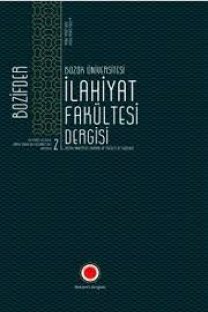İnsanın Yetkinleşmesinin Önündeki Nefsânî Engeller: Bursevî Örneğinde Bir İnceleme
Bu çalışma, İslam ahlâk geleneğindeki tekâmül/yetkinleşme kavramının Kur’ân-ı Kerîm’de ibadete/ubûdiyyete karşılık geldiğini ve insanın ubûdiyyetinin önüne geçen engellerin, aynı zamanda yetkinleşmesinin de önüne geçtiği tespitinden hareket etmektedir. Bu tespit, Osmanlı mutasavvıfı İsmail Hakkı Bursevî’nin düşüncesinin, temel eseri Rûhu’l-beyân’a yansıyan ana tezlerinden birini oluşturmaktadır. Bu çalışmada ilk önce nefsin yetkinleşmesinin ne olduğu tekâmül kavramı ekseninde İslam ahlâkçılarının metinlerine atıf yapılarak incelenmiş, bu kavramın vahiyde hangi bağlamlarda ortaya çıktığı tartışılmıştır. Bu bağlamda Râgıb İsfehânî, Gazâlî ve Bursevî gibi âlimlerde ibadetin içeriğine dair serdedilen yorumlara dikkat çekilmiştir. Çalışmada daha sonra nefsânî engellerin temelleri olarak tespit edilen iki kavram üzerine odaklanılmıştır: cehalet ve küfür. Son başlıkta ise bilgiye dayanan nefsânî eksikliklerin bir sonucu olarak ortaya çıkan kötü ahlâktan bahsedilmiştir. Çalışmada genel olarak Kur’ân’da yetkinleşmenin önünde sayılan ve insanın nefs sahibi olmasından kaynaklı engeller somut örnekler eşliğinde incelenmiş, vahyin felsefenin teorik olarak incelediği bir konuya hangi bağlamlarda temel oluşturduğuna dikkat çekilmiştir. Kur’ân ayetlerinin nefsânî engeller ile ilgili bağlamlarının tespit edilmesinde özellikle Osmanlı dönemi âlimi İsmail Hakkı Bursevî’nin Rûhu’l-beyân isimli tefsiri merkeze alınmıştır. Çalışmanın metodu açısından bu tefsirin başlıca odak noktasına alınmasının nedeni, Bursevî’nin klasik İslami ilimlerdeki hassasiyetine nazaran, kendisine kadar gelen tasavvuf ve felsefe birikimine vâkıf olmasıdır. Çalışmada ilâhî vahyin cehalet, küfür ve masiyet gibi olumsuz olarak nitelediği anlamların sadece şerʽî teklif planında kalmayıp, aynı zamanda ahlâk felsefesi ile ilgili kavramlar olarak görüldüğü ve bunların insanın yetkinleşmesi açısından başlıca olumsuz durumları ifade ettiği sonucuna ulaşılmıştır.
Obstacles of Nafs in the Process of Human Perfection: A Study in the Example of al-Bursawi
This study aims to analyze the term perfection (takāmul) in the Islamic tradition of ethics in its relation to the Quranic “servitude to God” (ʽibāda) and argue that the obstacles to servitude can be seen as the obstacles to human perfection. In the first title, the study examines the concept of perfection as it appears throughout the classical ethical texts in several selected examples and tries to shed light on which contexts this ethical term comes to the surface in the religious texts. The study, in the second step sheds light into two important terms as inner obstacles for human perfection, ignorance and unbelief. In essence, both ignorance and unbelief are the shortcomings of the human mind, and thus, they are epistemological errors. Finally, in the last title, the study deals with moral vices (bad human characters) in the context that they are the result of the given ignorance and unbelief. Bad characters are the practical results of the theoretical corruption; in the meantime, they can also be the causes of the theoretical deficiencies in the human mind. The study, as is found in the given classical sources, presents the examples of these bad manners as the love for the mundane, lust, pride, and vanity. Moreover, two important points are stressed in this title. Firstly, obedience to the orders of God as they are found in the Quran is seen by the theorists of the Islamic ethics as the fundamental step through human perfection. Secondly, the fuqahā (the jurisprudents in Islam) state that the classical Islamic disciplines of akhlāq and tasawwuf are equal to the practical philosophy in the classical understanding of philosophical disciplines. In order to search the given contexts in the Quran, Ismail Haqqi Bursawī’s tafsir Rūh al-Bayān is taken as the primary source, for it represents an amalgamation of the theoretical-ethical disciplines in Islamic tradition, such as falsafa, kalām, fiqh, and tasawwuf. The conclusion of this study states that the Quranic terms such as ignorance, unbelief, and sin are not only religious terms in the eyes of these scholars but also ethical terms which constitute the titles for the inward obstacles throughout the process of human perfection.
___
- Âmirî, Ebu’l-Hasen. el-Emed ale’l-ebed. çev. Yakup Kara. İstanbul: Türkiye Yazma Eserler Kurumu Başkanlığı, 2013.
- Bursevî, İsmail Hakkı. Rûhu’l-beyân. İstanbul: Eser Kitabevi, 1389.
- Cengiz, Yunus. “Ahlâk İlmi ve Diğer İlimlerle İlişkisi”. İslam Ahlâk Esasları ve Felsefesi. ed. Murat Demirkol. Ankara: Bilay, 2018, 17-35.
- Ergün, Ü. Betül Kanburoğlu. Gazzali Düşüncesinde İnsanın Kemâli. İstanbul: İLEM, 2020.
- Fârâbî, Ebû Nasr. Ârâ’ü ehli’l-medîneti’l-fâzıla. nşr. Elbır Nasrî Nâdir. Beyrut: Dârü’l-Meşrik, 2002.
- Fahri, Macit. İslam Ahlâk Teorileri. çev. M. İskenderoğlu, A. Arkan. İstanbul: Litera Yayıncılık, 2004.
- Gazâlî, Ebû Hâmid. İhyâ’ü ulûmi’d-dîn. trc. A. Serdaroğlu. İstanbul: Bedir, 2002.
- Gazâlî, Ebû Hâmid. el-Maksadü’l-esnâ fî şerhi esmâillâhi’l-hüsnâ. nşr. Bessâm Abdülvehhâb el-Câbî. Beyrut: Dârü İbn Hazm, 2003.
- Gazâlî, Ebû Hâmid Gazâlî. Kimyâ-yı Saâdet. trc. A. Faruk Meyan. İstanbul: Bedir Yayınları, 1979.
- Gümüşhânevî, Ahmed Ziyâüddîn Gümüşhânevî. Levâmi’u’l-ukûl. İstanbul: 1292.
- İbnü’l-Cevzî, Ebu’l-Ferec Abdurrahmân. Telbîsü İblîs. nşr. M. H. b. İsmail, M. A. Sa’denî. Beyrut: Dârü’l-Kütübi’l-İlmiyye, 1998.
- Kaya, Veysel. Felsefe ve Vahiy: Said b. Dadhürmüz ve Felsefi Risaleleri. İstanbul: Klasik, 2018.
- Kaya, Veysel. “Molla Hüsrev’in (885/1840) İlm-i Kelâma Yaklaşımı: O Bir Kelâm Karşıtı mıydı?”. Osmanlıda İlim ve Fikir Dünyası: İstanbul’un Fethinden Süleymaniye Medreselerinin Kuruluşuna Kadar. ed. Ömer Mahir Alper, Müstakim Arıcı. 197-214. İstanbul: Klasik Yayınları, 2015.
- Kefevî, Ebu’l-Bekâ. Külliyyât. nşr. A. Derviş, M. el-Masrî. Beyrut: Müessesetü’r-Risâle, 2012.
- Kindî, Yakub b. İshâk. Risâle fi’l-hîle li-def’i’l-ahzân. Mahmut Kaya. Kindî Felsefî Risâleler. İstanbul: Klasik, 2002.
- Kutluer, İlhan. Yitirilmiş Hikmeti Ararken. İstanbul: İz, 2012.
- Münzirî, Ebû Muhammed Zekiyyüddîn Abdülazim b. Abdülkavî. et-Tergîb ve’t-terhîb - Hadislerle İslâm. trc. A. M. Büyükçınar, A. Arpa, D. Pusmaz, A. Yücel. İstanbul: Huzur Yayınevi, 2020.
- Râgıb İsfehânî. el-Müfredât fî garîbi’l-Kur’ân. nşr. N. M. el-Bâz. b.y.: Mektebetü Nizâr Mustafa el-Bâz, ts.
